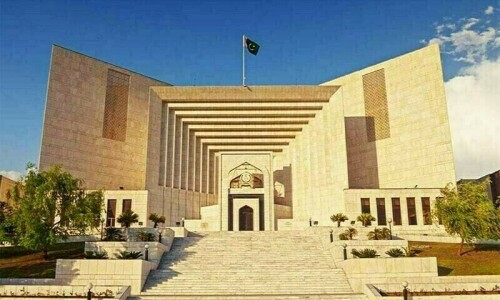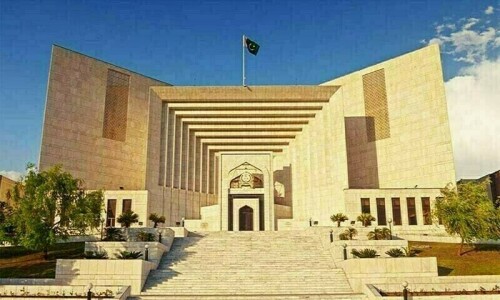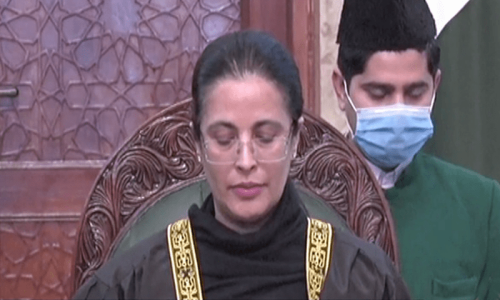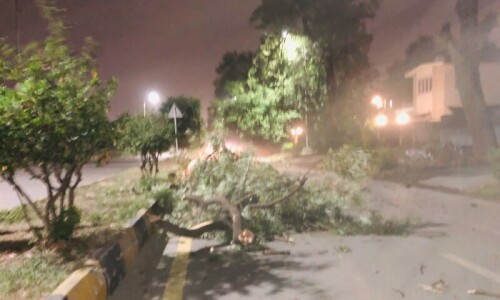ISLAMABAD: The Sunni Ittehad Council (SIC) has objected to the composition of an 11-judge constitutional bench hearing the reserved seats matter, with a request to refer the review petitions against the last year ruling to the relevant committee constituted under Supreme Court (Practice and Procedure) Act, 2023, for the formation of a new bench.
The objection was raised through an application filed by senior counsel Faisal Siddiqi on behalf of the SIC after the party had requested the constitutional bench to decide the 26th Amendment issue before hearing the review petitions against the apex court decision of July 2024 in the reserved seats case.
Also through senior counsel Hamid Khan, the SIC had requested the constitutional bench to postpone the next hearing of the review petitions scheduled for May 19 (tomorrow).
Mr Siddiqi, who filed the application seeking reconstitution of bench, had also expressed an intention of challenging the composition of the 11-judge bench during the May 13 proceedings after which the court postponed the proceedings till May 19 to allow the party to file a formal application.
Five major objections to the composition of the 11-judge constitutional bench raised
In the fresh application, the party raised mainly five objections to the composition of the bench hearing the review petitions in the reserved seats case.
It highlighted that the July 2024 judgement was issued by a full court comprising 13 judges. It pointed out that the constitutional bench while taking up the review petitions comprised 13 members but later the strength was reduced to 11 members. It argued that the any judgement can only be reviewed by a bench having same numerical strength that the original bench had. Thus, the existing 11-judge constitutional bench could not review the petitions, the SIC reiterated.
Besides, it argued, since the two dissenting judges of the original 13-judge bench namely Justice Ayesha A. Malik and Justice Aqil Ahmed Abbasi had not recused themselves from hearing the matter, they could not be excluded from the review bench.
It was a settled law, the SIC added, once a bench was constituted and seized of a matter on the judicial side, it could not be reconstituted in exercise of any administrative powers by the SC unless those members had recused themselves or there was some constitutional or legal bar requiring the reconstitution of the bench.
Otherwise, it would amount to stifling the independent view of an individual judge, the party argued. “Any effort to muffle disagreement or to silence dissent or to dampen an alternative viewpoint of a member on the bench, would shake the foundations of a free and impartial justice system, thereby eroding the public confidence on which the entire edifice of judicature stands,” the party emphasised.
According to the SIC, if the two dissenting members were excluded by the present CB, then under no provision or principle of constitutional and statutory law, could they be considered a part of the existing bench by fictional irrationality making it a 13-judge bench and then again by fictional irrationality counting their dismissal decision at the time of final adjudication. “There is no principle of the constitution or law that allows judges, by fiction, be considered to be sitting on a bench, hearing and adjudicating a particular case without these judges being actually present during such hearings,” it reasoned.
The SIC further argued that the July 2024 judgement was not delivered under pre-existing appellate jurisdiction as envisaged under Article 191A(3) and thus, the present challenges could not be considered review petitions to be transferred to the existing constitutional bench under Article 191A(5) of the Constitution. The review petitions must be heard and adjudicated by all the same serving judges who were part of the full court that delivered the July judgement, it emphasised.
Also, the SIC argued that since the constitutional bench under Article 191A(6) had not formulated any rules regulating its practice and procedure, the SC Rules, 1980, Order 26 dealing with review jurisdiction would apply to the CB under which the review applications have to be placed before the same bench that had delivered the original decision.
Published in Dawn, May 18th, 2025














































